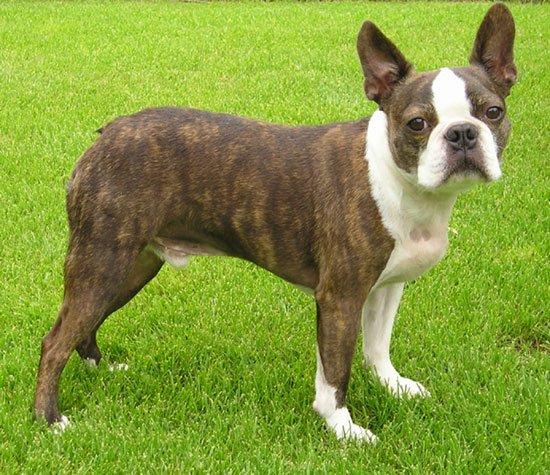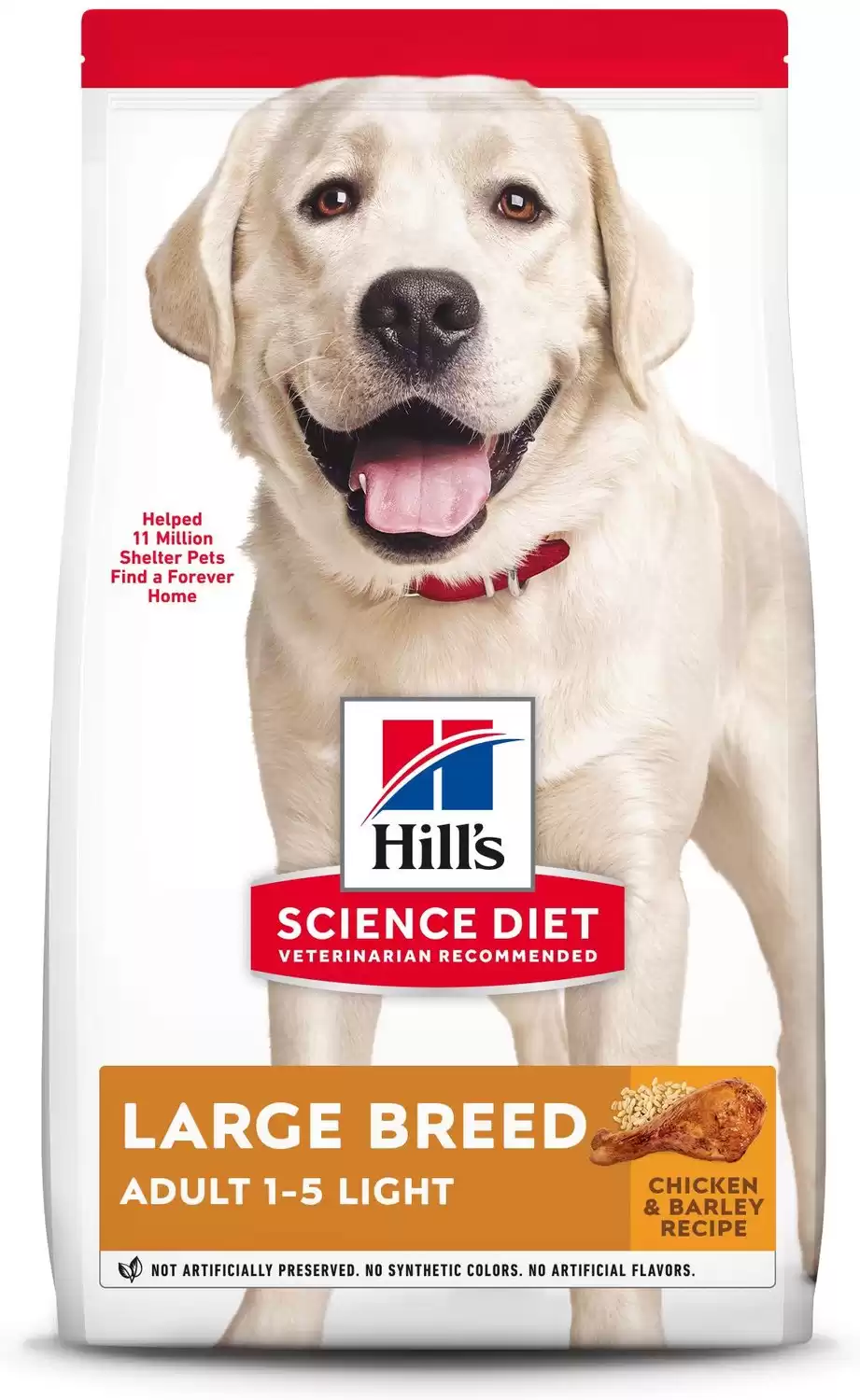Boston Terrier
Canis lupus
Friendly, lovable and very strong!
Advertisement
Boston Terrier Scientific Classification
- Kingdom
- Animalia
- Phylum
- Chordata
- Class
- Mammalia
- Order
- Carnivora
- Family
- Canidae
- Genus
- Canis
- Scientific Name
- Canis lupus
Read our Complete Guide to Classification of Animals.
Boston Terrier Conservation Status
Boston Terrier Facts
- Temperament
- Strong, friendly and devoted
- Training
- Should be trained from an early age in a patient and understanding way
- Diet
- Omnivore
- Average Litter Size
- 4
Boston Terrier as a Pet:
- General Health
- Energy Level
- Shedability
- Trainability
- Intelligence
- Tendency to Chew
- Size
- Family and kid friendliness
- Yappiness / Barking
- Moderate
- Separation Anxiety
- Moderate
- Preferred Temperature
- Average climate
- Exercise Needs
- Low
- Friendly With Other Dogs
- High
- Pure bred cost to own
- $600 to over $4,000
- Dog group
- Non-sporting
- Male weight
- 15-25 lbs
- Female weight
- 10-20 lbs
This post may contain affiliate links to our partners like Chewy, Amazon, and others. Purchasing through these helps us further the A-Z Animals mission to educate about the world's species.
View all of the Boston Terrier images!
Boston Terriers are small dogs with black and white coloring.
In the 1870s English Bulldogs and English White Terriers (now extinct) were crossbred, making a dog known as a Hooper’s Judge. In the years following, these dogs were crossbred with English Bull Terriers, Pit Bull Terrier, Boxers, and French Bulldogs. This crossbreeding gave us the animal we now know as the Boston Terrier.
See all of our expert product reviews.
Boston Terriers have a pretty even temperament. They are friendly and affectionate terriers that make a great family pet. They are very active, love to play, and can be easily trained. Learn more about the best dog breeds for families with children here.
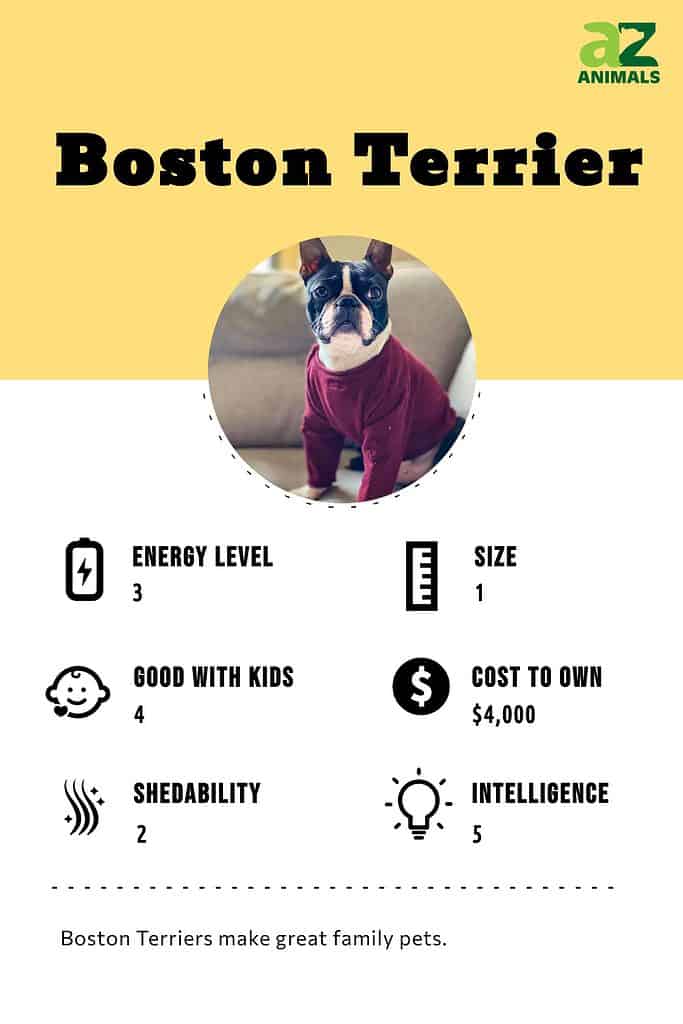
Owning a Boston Terrier: 3 Pros and Cons
| Pros! | Cons! |
| Great family dogs Boston terriers are affectionate with families and generally do very well with kids! | Stresses to climate Boston terriers have short coats which isn’t suited to very cold climates. In addition, they struggle in environments with extremely warm weather. |
| Less shedding! | Short nose problems In addition to difficulties with warm weather (short nose dogs struggle to cool warm air coming into their lungs), the Boston Terrier’s short nose can lead to snoring and drooling. |
| A quiet breed Another reason that Boston Terriers make great apartment dogs is that they tend to be more quiet than other breeds. While all dogs bark, Boston Terriers mostly saving their barks for direct interactions. | A gassy situation Another byproduct of having a short-nose is that Boston Terriers tend to be very gassy dogs. To cut down on a Terrier’s gas, monitor their diet and remove low-quality foods. |
History and Origins
In the 19th century, there was an enthusiasm in England for blood sports, which caused breeders to mix terriers and bull-type dogs with the purpose of creating canines who could compete well in pits and rat-catching contests. Judge, a muscular and strong dog, was the result of a mating between a Bulldog and a now-vanished white English Terrier, which happened in Liverpool in the late 1860s.
In 1870, William O’Brien sold his Boston Terrier, Judge, to another Bostonian, Robert C. Hooper. This pup has gone down in history as ‘Hooper’s Judge’ and is the ancestor of almost all modern-day Boston Terriers.
A breed historian described Judge, the ancestor of the current Boston Terrier, as a well-built dog with a weight of about 32 pounds. His coat was dark brindle with a white stripe across his face, and he had a square head with a nearly even muzzle – much like that of the modern Boston Terrier.
Hooper bred Judge with a white female, Burnett’s Gyp, belonging to Edward Burnett from Southboro, Massachusetts. This genealogy is well-known among Boston Terrier fanciers, and Judge and Gyp gave rise to Well’s Eph, who then begot Tobin’s Kate and so on. During the early years of the breed’s development, selective breeding changed the large fighter of Judge’s era into a smaller, gentler, and more appealing pet dog, which was initially named the Round Head by its supporters.
Health and Entertainment for your Boston Terrier
See all of our expert product reviews.
In recognition of the city where these cheerful canines were carefully bred, their name was altered to Boston Terrier. Established in 1891, the Boston Terrier Club of America was established, and two years later, the AKC enrolled its first pup of the breed.
Boston Terriers have long been a source of pride for the city of Boston. For almost a century, they have been Boston University’s mascot, and in 1979, the state legislature declared the breed to be the official dog of Massachusetts, calling it the “American Gentleman.”
Size and Weight
Boston Terriers are small dogs. Males have an average height of 17 inches, and females are just a touch shorter, with an average height of 16 inches. There are three different weight categories that Boston Terriers may fall into. They are: under 15 pounds, between 15 and 20 pounds, and between 20 and 25 pounds. Adult males typically weigh between 15 and 25 pounds, while adult females typically between 10 and 20 pounds.
A Boston Terrier puppy only weighs about half a pound when it is first born. However, they grow pretty quickly, reaching an average of nearly 9 pounds at the age of 4 months and nearly 20 pounds at 8 months. By the time they are 1 year old, Boston Terriers are fully grown.
| Height (Male) | 17” Tall |
| Height (Female) | 16” Tall |
| Weight (Male) | 15-25 lbs., fully grown |
| Weight (Female) | 10-20 lbs., fully grown |
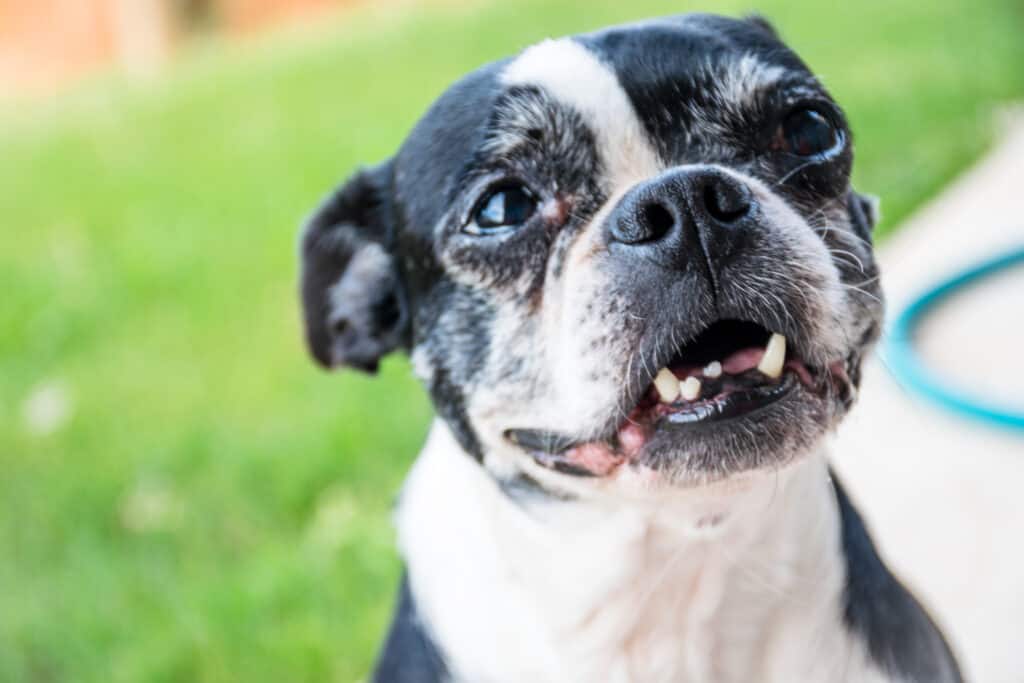
Boston Terriers are usually between 10-25 pounds.
©Roschetzky Photography/Shutterstock.com
Common Health Issues
There are some common health issues you’ll want to be on the lookout for if you have a Boston Terrier. One ailment that some Boston Terriers suffer from is Brachycephalic Syndrome. Brachycephalic refers to the short and flat face of a Boston Terrier. Dogs with Brachycephalic Syndrome have too much soft tissue in their airways, which can make it challenging for them to breathe. Boston Terriers with this syndrome may have stenotic nares, everted laryngeal saccules, or an elongated soft palate. Brachycephalic Syndrome is the most common health concern that Boston Terriers face.
Another possible health concern is Patellar Luxation. This is a slipped kneecap that makes it difficult for Boston Terriers to walk. At first, dogs won’t be in pain when they walk, but if left untreated, the knee cap will become inflamed, which might cause your Boston Terrier to experience pain. This is a genetic condition that sometimes requires surgery to treat.
Boston Terriers also suffer from eye injuries since their eyes protrude from their head. They may scratch their eyeball or come down with pink eye or conjunctivitis. In addition to eye injuries, Boston Terriers may get cataracts. This is another genetic trait that sometimes shows up in puppies as young as eight weeks old.
Some Boston Terriers also get Keratoconjunctivitis Sicca, which is dry eye. If your Boston Terrier has this condition, it won’t be able to make enough of its own tears to keep its eyes moist, which can lead to sores, itchiness, or even infections. Another potential eye problem to watch out for is glaucoma. Boston Terriers with glaucoma have a blockage in their eyeball which prevents it from draining. This can lead to too much pressure, which can damage their optic nerve.
Hemivertebrae is a condition in which Boston Terriers have improperly shaped vertebrae in different sections of their spinal column. A corkscrew-shaped tail is often a sign of this condition.
Boston Terriers can also have allergies, most commonly skin allergies. This can cause them to lick, scratch, or chew themselves. Sometimes Boston Terriers may be allergic to specific foods or other items in their home or environment, such as pollen or cleaning products.
Unfortunately, some Boston Terriers also suffer from epilepsy or regular seizures. The seizures are caused by their rounded head shape and may cause dogs to shake, twitch, or foam at the mouth. In most cases, if a dog is going to suffer from epilepsy, the seizures will start by the age of three.
A final health concern in some Boston Terriers is deafness. This is another genetic condition that may be passed down to your dog. You’ll want to consult with your veterinarian if you think your dog is having trouble hearing you.
Remember, the most common ailments Boston Terriers may suffer from include:
- Brachycephalic Syndrome
- Patellar Luxation
- Eye injuries
- Cataracts
- Keratoconjunctivitis Sicca
- Glaucoma
- Hemivertebrae
- Allergies
- Epilepsy
- Deafness
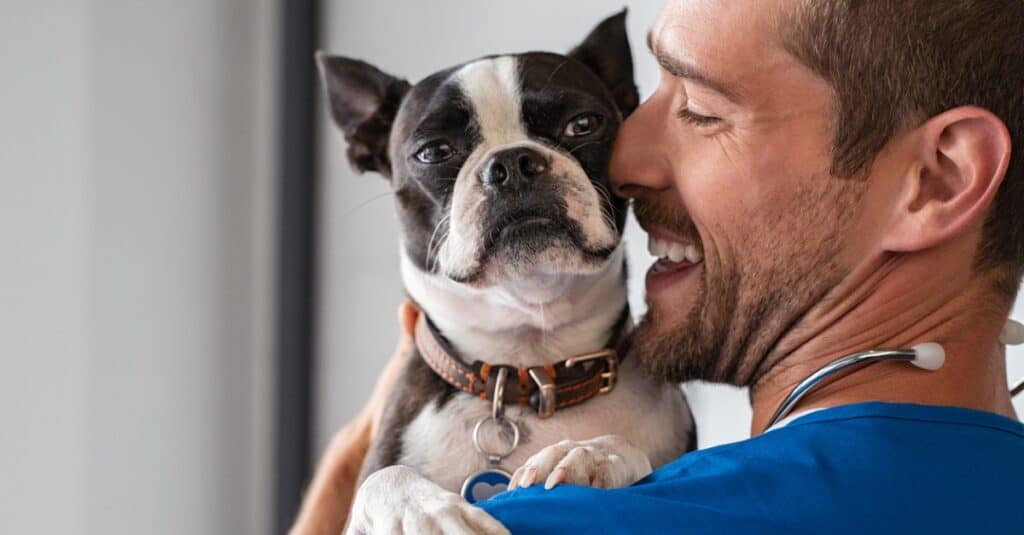
Boston terriers are prone to many health conditions and can be expensive to own in terms of veterinary care.
©iStock.com/Ridofranz
Temperament and Behavior
Boston Terriers have a very friendly and social personalities. They are loving and affectionate towards their owners. At times, Boston Terriers can be territorial and may display mildly aggressive behavior if they feel they or someone in their family is being threatened.
Boston Terriers also display playful traits. They are high-energy and enjoy playing with their owners. A Boston Terrier’s traits and personality make them a good dog to have with children, particularly older children. Boston Terriers are often good around other dogs and cats. When possible, introducing them to other animals at a younger age is best.
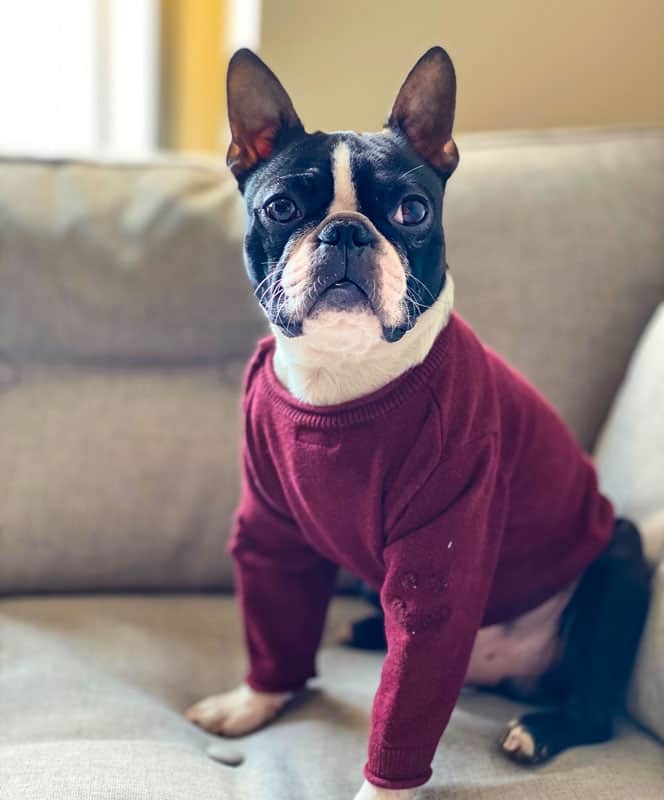
Boston terriers are friendly and social dogs.
©iStock.com/Karetyna Varhanova
How to Take Care of Boston Terriers
If you are thinking about adding a Boston Terrier to your family, there are a few important considerations you’ll want to keep in mind as you are planning how you’ll care for them. Boston Terriers and Boston Terrier puppies make great pets but will have some special needs you’ll want to keep in mind.
Puppy Food
Boston Terrier puppies have a faster metabolism and require enough energy to help them grow. Because of this, puppies need to eat more times throughout the day than adult dogs do. Very young puppies (under 3 months) should eat between 4 and 5 times a day, puppies between the ages of 3 and 5 months should eat about three times a day, and once puppies get to be at least 6 months, they should be fine eating twice a day.
The food you choose for your puppy should be high in protein and should not have many grains (and only high-quality grains if you choose a food that is not grain-free). There are no specific allergens that are more likely to be a problem for Boston Terriers, but be sure to check your puppy for any signs of an allergic reaction when starting a new food. Also, avoid any foods that are too salty or sugary since these can cause Boston Terriers to develop heart or weight issues.
Adult Food
The age of your dog, how much he or she weighs, and how active he or she is will impact the amount of food they should be eating each day. It is important to regulate how much food you feed your Boston Terrier. Boston Terriers can suffer from gastritis, flatulence, and even obesity, so making sure they do not overeat is important. Typically, adult Boston Terriers eat one to two times a day.
Like puppies, adult Boston Terriers should be feed foods that have a good mix of proteins, fats, and carbohydrates. Look for foods that are rich in vitamins and minerals that will contribute to the overall health of your dog.
The Best Dog Food
Since every dog breed is different, you will want to plan a diet that meets the needs of your Boston Terrier or Boston Terrier puppy.
Due to potential issues with their eyes and joints and other health concerns, Boston Terrier owners should be diligent in selecting dog food that provides a full range of nutrition.
Therefore, A-Z Animals says the best food to keep Boston Terriers healthy and active is Hill’s Science Diet Dry Dog Food, Adult Light for Healthy Weight & Weight Management, Small Bites.
Since Boston Terriers’ eyes are so vulnerable to complications like keratoconjunctivitis sicca, glaucoma, cataracts, and injuries, we love that this food is fortified with Vitamin A, taurine, and beta-carotene to promote eye health. Plus, there’s copper to help form solid connective tissues, with calcium to support strong bones, cartilage, and joints and reduce Boston Terriers’ chances of struggling with patellar luxation. Plus, there’s thiamine and pyridoxine, which nourish neural tissue in the nervous system to help prevent seizures.
Check Chewy and Amazon for this product.
Maintenance and Grooming
Boston Terriers do shed, but not as much as some other dog breeds. Weekly brushing can help you remove your dog’s loose hair and minimize the amount they shed. When grooming your Boston Terrier, you can use a grooming mitt, a soft-bristled brush, or other grooming tools, including this upgraded pet grooming mitt.
- Removes loose hair without pulling it off
- Hair simply sticks to the surface
- Features high-quality silicone tips
- Waterproof, can be used to wash your cat
Training
Because of their very eager-to-please personality, Boston Terriers can be easier to train than many other breeds. Ideally, you’ll want to start training your Boston Terrier from an early age and make sure they get exposed to different people, places, and situations while they are still young. Signing them up for an obedience class when they are still a puppy is also a good idea.
Exercise
Boston Terriers need regular exercise, but not as much as some larger dogs. For most Boston Terriers, a few walks with you and some play time each day are sufficient. Some higher-energy Boston Terriers may require a little more activity than this. Since Boston Terriers are very playful, a good way to help your dog get some exercise is to play with them by throwing a ball or other toy for them to retrieve.
A-Z Animals recommends the medium ChuckIt ball tosser for exercising your Boston Terrier.
- Comes with an ergonomic handle
- Can throw ball 3 times further
- Comes with a brightly colored ball
- Can also use in the pool on warm days
Puppies
The average litter size for Boston Terriers is between three and five puppies. If you’re planning to adopt a Boston Terrier puppy, there are a few things you should do to get ready for the dog.
First, make sure you have an experienced and trustworthy vet you can bring your puppy to shortly after you bring them home. You’ll also want to have a conversation with your breeder about the health of the Boston Terrier puppy, and if there are any specific health concerns you should be aware of. Find out as much as you can about the medical history of the puppy’s parents.
Next, puppy-proof your home. Move any shoes or other items that might be appealing for a puppy to chew up high so they won’t get ruined. Make sure there are no hazardous plants or toxic chemical anywhere the puppy will be able to get at them and look for anything else that could potentially endanger a young pup.
Finally, make sure you have everything you’ll need to welcome your new puppy home. This should include puppy food, food and water bowls, a leash and collar, dog beds, and toys. Plan to take at least a few days off work to stay home when your new puppy arrives. Taking care of a puppy is a lot like taking care of a baby; they need a lot of attention and care.
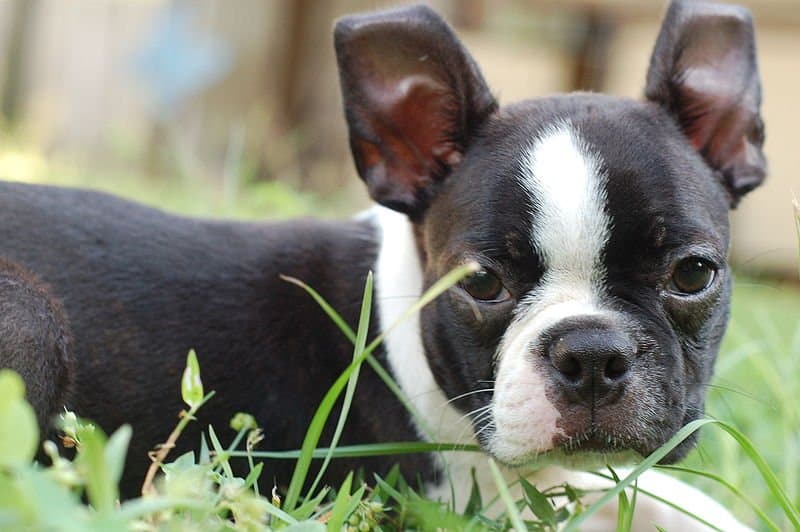
Be sure to puppy-proof your home before bringing home your Boston Terrier puppy
With Children
Boston Terriers are a good family pet. They enjoy playing and can be very friendly and affectionate. Boston Terriers are also accepting of other people coming into the house, which means they should be fine with children having their friends over to the house.
Since Boston Terriers are smaller dogs, they typically do better with older children who are able to be a little more respectful of their needs and know how to be gentle. This doesn’t mean you can’t have a Boston Terrier if you have a toddler, but you will just want to work with your toddler to make sure they know how to be gentle with the dog.
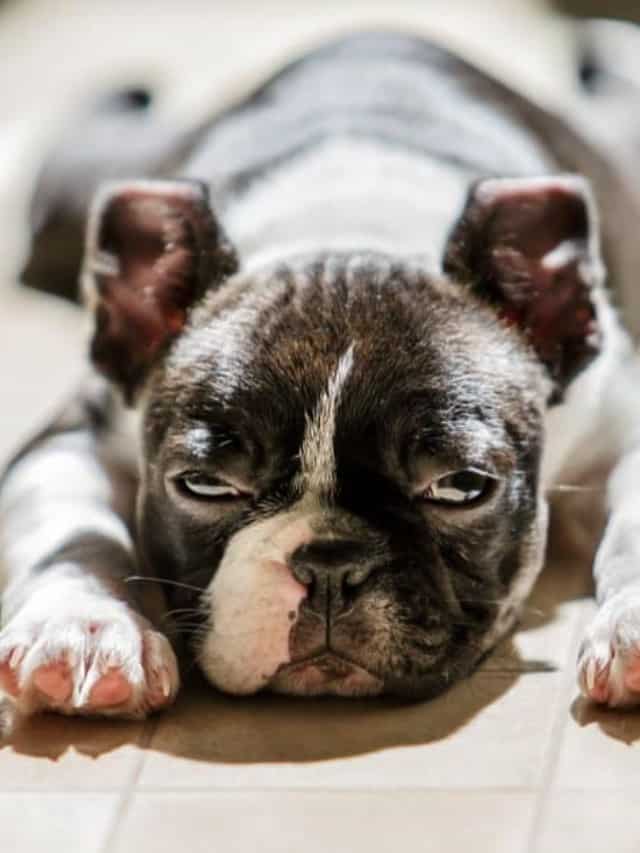
Young children must be taught how to be gentle with small dogs like Boston Terriers.
©Nailia Schwarz/Shutterstock.com
Dogs Similar to Boston Terriers
French Bulldogs, Pugs, and Mastiffs are other dog breeds that are similar to the Boston Terrier.
- French Bulldog: French Bulldogs and Boston Terriers both are similar in appearance. They have smaller, wrinkly faces and are both descendants of English Bulldogs. French Bulldogs have more rounded ears and a more squared head than Boston Terriers. Both French Bulldogs and Boston Terriers a very friendly and will make a great family pets.
- Pug: Pugs are similar to Boston Terriers in that they are both very loving and social. They are both good dogs for owners who are not as active and won’t be able to take their dogs out for long walks on a regular basis. Like Boston Terriers, Pugs are also Brachycephalic dogs.
- Mastiff: While Mastiffs are much larger dogs than Boston Terriers, both breeds are intelligent, easy to train, and very loyal to their owners. One big difference between Mastiffs and Boston Terriers is the litter size. While Boston Terriers typically have a litter size of three to five puppies, mastiffs have an average litter size of eight puppies.
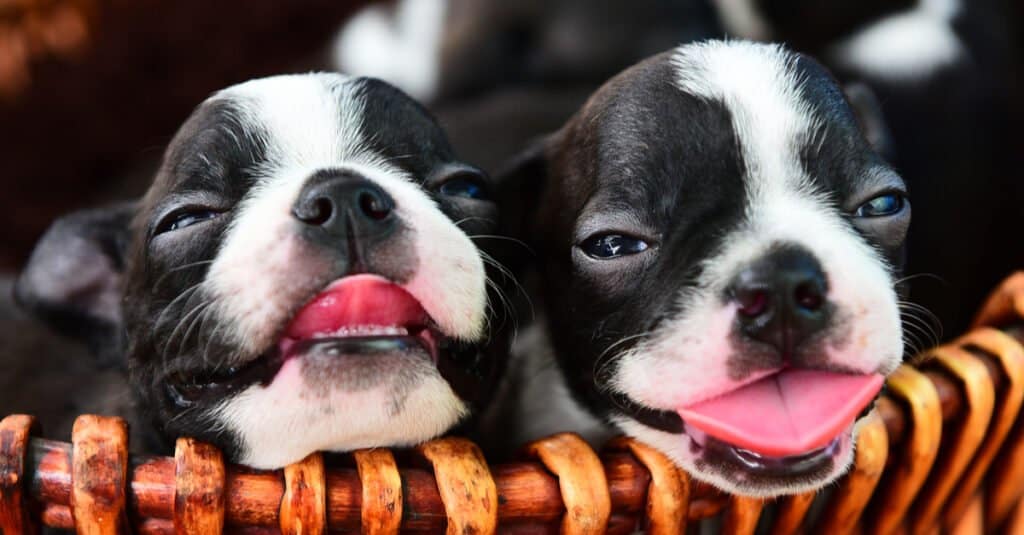
An enclosed space is crucial to help maintain and protect newborn Boston terrier puppies.
©Various photo/Shutterstock.com
Popular Names
Popular names for Boston Terriers include:
- Buddy
- Oreo
- Molly
- Jack
- Bella
- Lucy
- Cooper
- Ruby
- Harley
- Duke
- Oliver
Famous Boston Terriers
There are many “famous” Boston Terriers that can be found across media and the entertainment industry.
- Rhett: Is a cartoon Boston Terrier that’s the mascot of Boston University. His name — “Rhett” — comes from a Gone with the Wind character!
- Verna Pearl: The beloved Boston Terrier of actor Robin Williams. Mr. Williams had many pets and acted on behalf of many conservationist issues!
- Lulu: Joan Rivers has been pictured in everything from “Got Milk” ads to Vanity Fair cover spreads with her dogs. One of her favorites was her Boston Terrier, Lulu, who passed away in 2016.
Boston Terrier FAQs (Frequently Asked Questions)
How much does a Boston Terrier cost to own?
Boston Terriers can cost anywhere from $600 to over $4,000 when purchased from a breeder. However, the average price is typically in the $600 to $1,200 range. You’ll also want to make sure you budget for food, vet expenses, training, toys, and supplies, like leashes and food/water bowls. The average yearly cost for all of these items is about $1,600.
Are Boston Terrier good with kids?
Yes, Boston Terriers are good with kids. They are very friendly, affectionate, and playful. These traits along with their even temperament make them an excellent family dog.
How long do Boston Terriers live?
Boston Terriers live an average of 10 to 14 years.
What is bad about Boston Terriers?
While Boston Terriers are great pets overall, there are a few downsides to owning this breed. Some Boston Terriers can suffer from numerous health problems. If you don’t get your dog from a reputable breeder, you run the risk of them having more health issues that won’t be disclosed to you.
Another downside of owning a Boston Terrier is that they can be pretty gassy. They also make lots of wheezing, snorting, grunting, and snoring sounds. You’ll also want to plan for a few months to crate train your dog, which may be frustrating to some.
Do Boston Terriers bark a lot?
No, Boston Terriers don’t bark too often. If a Boston Terrier does bark, they generally make a lower woofing sound instead of a loud bark that some other dogs make.
Can Boston Terriers be left alone?
While your Boston Terrier will definitely prefer to be home with you, they can be left alone. Try not to leave them alone for more than eight hours, and always make sure they are in a safe place when they are left alone. Crates or completely dog-proofed areas are examples of safe places for your Boston Terrier to be when they are home alone.
What is the difference between a Boston Terrier and a French Bulldog?
Boston Terriers and French Bulldogs both look very similar with their smaller, wrinkled faces. However, there are a few key differences between these two breeds. Boston Terriers have pointier ears and a rounder head than French Bulldogs. Boston Terriers are a little taller and less muscular than French Bulldogs.
One other main difference between Boston Terriers and French Bulldogs is their coloring. Boston Terriers typically have black and white coloring, while French Bulldogs come in a wider variety of colors, such as white, cream, or brindle.
Are Boston Terriers herbivores, carnivores, or omnivores?
Boston Terriers are Omnivores, meaning they eat both plants and other animals.
What Kingdom do Boston Terriers belong to?
Boston Terriers belong to the Kingdom Animalia.
What class do Boston Terriers belong to?
Boston Terriers belong to the class Mammalia.
What phylum to Boston Terriers belong to?
Boston Terriers belong to the phylum Chordata.
What family do Boston Terriers belong to?
Boston Terriers belong to the family Canidae.
What order do Boston Terriers belong to?
Boston Terriers belong to the order Carnivora.
What genus do Boston Terriers belong to?
Boston Terriers belong to the genus Canis.
What type of covering do Boston Terriers have?
Boston Terriers are covered in Hair.
How many babies do Boston Terriers have?
The average number of babies a Boston Terrier has is 4.
What is an interesting fact about Boston Terriers?
Boston Terriers are friendly, lovable, and very strong!
What is the scientific name for the Boston Terrier?
The scientific name for the Boston Terrier is Canis lupus.
What's the difference between Boston Terriers and Border Terriers?
Boston Terriers are larger than Border Terriers, and they have different locations of their breed’s origin. Additionally, the Border Terrier has coarse and shaggy fur, while the Boston Terrier’s fur is smooth.
Thank you for reading! Have some feedback for us? Contact the AZ Animals editorial team.
Sources
- David Burnie, Dorling Kindersley (2011) Animal, The Definitive Visual Guide To The World's Wildlife
- Tom Jackson, Lorenz Books (2007) The World Encyclopedia Of Animals
- David Burnie, Kingfisher (2011) The Kingfisher Animal Encyclopedia
- Richard Mackay, University of California Press (2009) The Atlas Of Endangered Species
- David Burnie, Dorling Kindersley (2008) Illustrated Encyclopedia Of Animals
- Dorling Kindersley (2006) Dorling Kindersley Encyclopedia Of Animals
- , Available here: https://www.hillspet.com/dog-care/dog-breeds/boston-terrier#:~:text=Boston%20terriers%20have%20three%20weight,%2Dproportioned%2C%20handsome%20little%20dogs.
- , Available here: https://www.bostonterriersociety.com/boston-terrier-puppy-development/
- , Available here: https://www.bostonterriersociety.com/boston-terrier-common-health-problems/
- , Available here: https://www.pets4homes.co.uk/pet-advice/health-issues-more-commonly-seen-in-the-boston-terrier.html
- , Available here: https://www.dogbreeds911.com/boston-terrier-vs-pug.html
- , Available here: https://www.rover.com/blog/uk/boston-terrier-vs-french-bulldog-whats-the-difference/
- , Available here: https://dogell.com/en/compare-dog-breeds/boston-terrier-vs-mastiff
- , Available here: https://petcentral.chewy.com/behavior-breeds-boston-terrier-dog-breed/
- , Available here: https://www.bostonterriersociety.com/boston-terriers-family-pet/
- , Available here: https://www.bostonterriersociety.com/boston-terrier-puppy-diet/
- , Available here: https://www.yourpurebredpuppy.com/reviews/bostonterriers.html#:~:text=Unfortunately%2C%20breeders%20deliberately%20breed%20these,See%20Boston%20Terrier%20Health.





